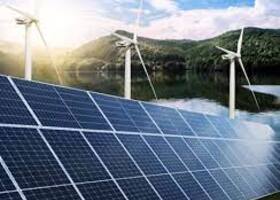sources of alternative energy
Alternative energy is a term used to refer to forms of energy that are naturally obtained from the environment and from sources that be replenished naturally. These include solar energy, wind energy, geothermal energy, hydropower and biomass.
Sources of alternative energy are energies that are not derived from fossil fuels such as coal, oil, and natural gas. They are renewable and sustainable sources of energy that have a lower impact on the environment compared to fossil fuels. Here are some examples of alternative energy sources:
1,Solar power: This is the energy derived from the sun’s rays. It can be harnessed using solar panels and used to power homes, cars, and other applications.
2.Wind power: This is the energy derived from the wind’s motion. It can be harnessed using wind turbines and used to generate electricity.
3.Hydroelectric power: This is the energy derived from the movement of water. It can be harnessed using dams or other devices and used to generate electricity.
4.Geothermal energy: This is the energy derived from the earth’s heat. It can be harnessed using geothermal power plants and used to generate electricity.
Sources of alternative energy for homes include:
*Solar power: This can be used to power homes and reduce dependence on grid electricity.
*Wind power: Small-scale wind turbines can be used to generate electricity for homes.
*Geothermal energy: Ground-source heat pumps can be used to provide heating and cooling for homes.
*Biomass: This is the energy derived from organic matter such as wood chips, corn, and other agricultural products. It can be used to provide heating and electricity for homes.
Alternative energy sources for cars include:
*Electric vehicles: These vehicles run on electricity, which can be derived from renewable sources such as solar and wind power.
*Hybrid vehicles: These vehicles combine an internal combustion engine with an electric motor and battery, reducing fuel consumption and emissions.
*Biofuels: These are fuels derived from organic matter such as corn, sugarcane, and soybeans. They can be used to power vehicles and reduce dependence on fossil fuels.
*Hydrogen fuel cells: These cells convert hydrogen into electricity, producing water as the only byproduct. They can be used to power vehicles and reduce emissions.
Sources of Renewable Energy:
There five(5) major sources of alternative energy
-solar energy
-wind energy
-geothermal energy
-hydro-power
biomass energy
Solar energy is radiant light and heat from the sun that is harnessed using a range of technologies such as solar power to generate electricity, solar thermal energy including solar water heating, and solar architecture.
Wind energy is mostly to use of wind turbines to generate electricity. Wind power is a popular, sustainable, renewable energy source that has a smaller impact on the environment than burning fossil fuel. Wind farm consist of many individual wind turbines, which are connected to the electric power transmission network.
Geothermal power is electrical power generated from geothermal energy. Technologies include dry steam power stations, flash steam power stations, and binary cycle power stations.
Hydro power is the use of falling or fast-running water to produce electricity or to power machine. Hydro-power is an attractive alternative energy to fossil fuel and it provides a relatively constant source of power.
Biomass energy is a plant-based material used as fossil to produce heat or electricity. Examples are wood and wood residues, energy crops, agricultural residues, and waste from industry, farm and households.
Advantages of Alternative Energy
-Less maintenance value as most sources entail few or no moving parts, hence, less mechanical damage.
-They are economical and may cut prices spent on fossil fuel
–Renewable energy sources don’t deplete. Therefore, these have a higher prospect for the longer term
Disadvantages of Alternative Energy
-The electricity generation capability remains not massive enough
-Renewable energy may be unreliable
-Low-efficient levels
-Requires a large direct capital
-Takes a lot of spaces to install
-Expensive storage prices
-Not always a comercially-viable option
